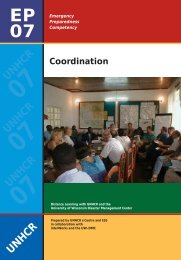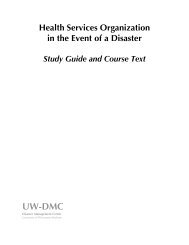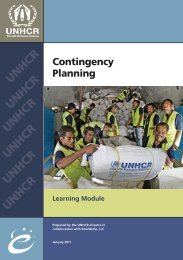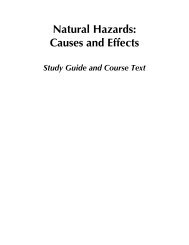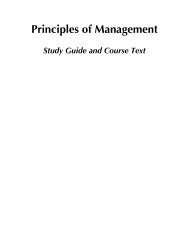Managing External Relations - Disaster Management Center ...
Managing External Relations - Disaster Management Center ...
Managing External Relations - Disaster Management Center ...
Create successful ePaper yourself
Turn your PDF publications into a flip-book with our unique Google optimized e-Paper software.
EP<br />
04<br />
62<br />
<strong>Managing</strong> <strong>External</strong> <strong>Relations</strong><br />
How to Handle an Interview<br />
The media usually has nothing to lose by interviewing you, but you or those you represent may lose<br />
if you do not handle the interview well. Some guidelines for avoiding problems and optimising<br />
results include:<br />
1. Know the media you are working with, including their ground rules<br />
and their intentions or hidden agendas.<br />
2. Never go to a media interview unprepared—even in emergencies.<br />
If possible, discuss the interview first with a Public Information or Press Officer.<br />
Practice with an associate. Utilise the appropriate facilitation and presentation tips<br />
mentioned above so that you will be in control during the interview. Try to<br />
prepare for all possible angles of the story.<br />
3. Adapt your replies to the type of media. Newspaper interviews allow you<br />
time to explain, while radio and TV interviews require ‘headline’ or ‘quotable’<br />
answers—short and to the point. (Remember, a ten-minute interview may end up<br />
being seconds on the air or a few lines in a newspaper.)<br />
4. Be honest, clear and direct. Honesty is the best policy in regard to problems<br />
encountered in emergency operations.<br />
5. When in doubt, err on the side of discretion, particularly if the questioner<br />
is not known to you. While most journalists understand the difficult conditions<br />
that UNHCR works in, some may pressure you for more information to get a<br />
story. Do not feel forced to say more than you want or are authorised to say.<br />
Say what you have to say and then stop. Generally, the tougher the question,<br />
the shorter your answer should be.<br />
6. The safest way to deal with the press is not to make ‘off the record’<br />
statements. Similarly, asking for a story to be suppressed is likely to backfire by<br />
creating more interest in it. If asked to reveal confidential information, rather than<br />
saying ‘no comment,’ a rational explanation of the nature of the information may<br />
be given. If facts are not known, offer to get back to the reporter with the<br />
information. Avoid answering speculative ‘what if’ questions by saying that you<br />
would rather not speculate. If a reporter uses negative, hypothetical or incorrect<br />
words in a question, do not validate them by repeating them in your answer.<br />
7. Be composed at all times, relax and be friendly if possible. The more<br />
aggressive the interviewer or journalist, the more composed you should be.<br />
8. Be positive and direct the interview into positive areas of the organisation’s<br />
operations. Do not criticise colleagues or other organisations or their performance<br />
in the emergency response.<br />
9. Publicise UNHCR by wearing a UNHCR tee shirt or cap and/or placing a UNHCR<br />
logo in the background, either on a vehicle or a flag.<br />
10. Avoid the use of jargon or phrases unfamiliar to the general public, wisecracks,<br />
jewellery or sunglasses, sitting in moveable chairs, smoking, and nervous<br />
gestures.



